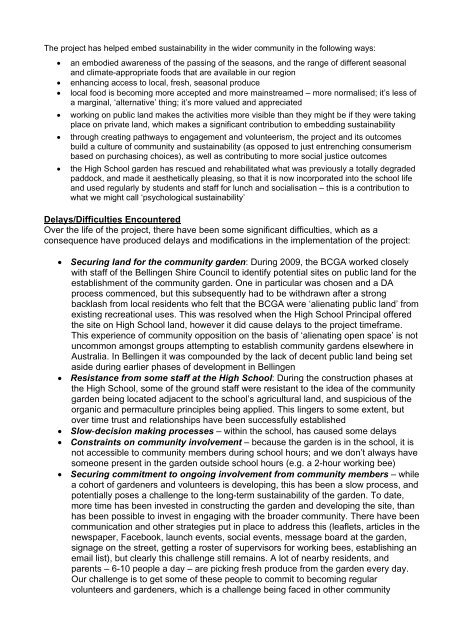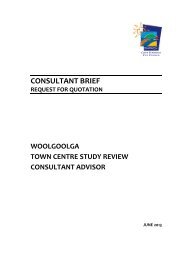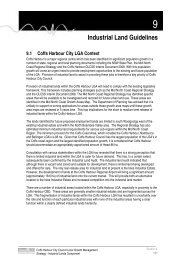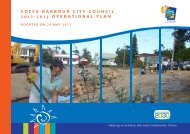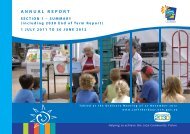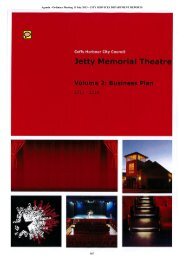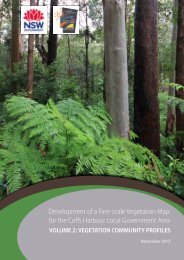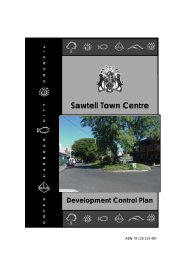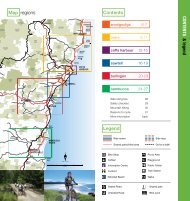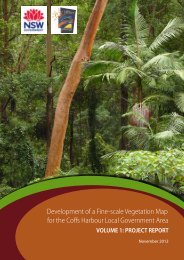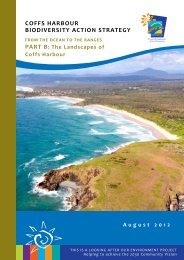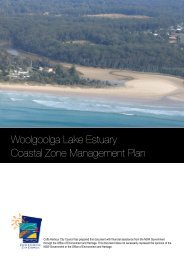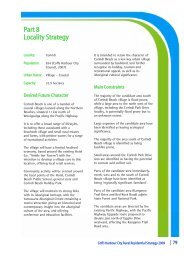Coffs Coast Local Food Futures Part A_Final Report - Coffs Harbour ...
Coffs Coast Local Food Futures Part A_Final Report - Coffs Harbour ...
Coffs Coast Local Food Futures Part A_Final Report - Coffs Harbour ...
Create successful ePaper yourself
Turn your PDF publications into a flip-book with our unique Google optimized e-Paper software.
The project has helped embed sustainability in the wider community in the following ways:<br />
<br />
<br />
<br />
<br />
<br />
<br />
an embodied awareness of the passing of the seasons, and the range of different seasonal<br />
and climate-appropriate foods that are available in our region<br />
enhancing access to local, fresh, seasonal produce<br />
local food is becoming more accepted and more mainstreamed – more normalised; it’s less of<br />
a marginal, ‘alternative’ thing; it’s more valued and appreciated<br />
working on public land makes the activities more visible than they might be if they were taking<br />
place on private land, which makes a significant contribution to embedding sustainability<br />
through creating pathways to engagement and volunteerism, the project and its outcomes<br />
build a culture of community and sustainability (as opposed to just entrenching consumerism<br />
based on purchasing choices), as well as contributing to more social justice outcomes<br />
the High School garden has rescued and rehabilitated what was previously a totally degraded<br />
paddock, and made it aesthetically pleasing, so that it is now incorporated into the school life<br />
and used regularly by students and staff for lunch and socialisation – this is a contribution to<br />
what we might call ‘psychological sustainability’<br />
Delays/Difficulties Encountered<br />
Over the life of the project, there have been some significant difficulties, which as a<br />
consequence have produced delays and modifications in the implementation of the project:<br />
Securing land for the community garden: During 2009, the BCGA worked closely<br />
with staff of the Bellingen Shire Council to identify potential sites on public land for the<br />
establishment of the community garden. One in particular was chosen and a DA<br />
process commenced, but this subsequently had to be withdrawn after a strong<br />
backlash from local residents who felt that the BCGA were ‘alienating public land’ from<br />
existing recreational uses. This was resolved when the High School Principal offered<br />
the site on High School land, however it did cause delays to the project timeframe.<br />
This experience of community opposition on the basis of ‘alienating open space’ is not<br />
uncommon amongst groups attempting to establish community gardens elsewhere in<br />
Australia. In Bellingen it was compounded by the lack of decent public land being set<br />
aside during earlier phases of development in Bellingen<br />
Resistance from some staff at the High School: During the construction phases at<br />
the High School, some of the ground staff were resistant to the idea of the community<br />
garden being located adjacent to the school’s agricultural land, and suspicious of the<br />
organic and permaculture principles being applied. This lingers to some extent, but<br />
over time trust and relationships have been successfully established<br />
Slow-decision making processes – within the school, has caused some delays<br />
Constraints on community involvement – because the garden is in the school, it is<br />
not accessible to community members during school hours; and we don’t always have<br />
someone present in the garden outside school hours (e.g. a 2-hour working bee)<br />
Securing commitment to ongoing involvement from community members – while<br />
a cohort of gardeners and volunteers is developing, this has been a slow process, and<br />
potentially poses a challenge to the long-term sustainability of the garden. To date,<br />
more time has been invested in constructing the garden and developing the site, than<br />
has been possible to invest in engaging with the broader community. There have been<br />
communication and other strategies put in place to address this (leaflets, articles in the<br />
newspaper, Facebook, launch events, social events, message board at the garden,<br />
signage on the street, getting a roster of supervisors for working bees, establishing an<br />
email list), but clearly this challenge still remains. A lot of nearby residents, and<br />
parents – 6-10 people a day – are picking fresh produce from the garden every day.<br />
Our challenge is to get some of these people to commit to becoming regular<br />
volunteers and gardeners, which is a challenge being faced in other community


